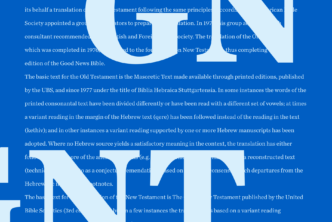Today’s guest post is from Rich Penix. Penix recently completed a Master of Arts in Biblical Studies at Reformed Theological Seminary in Orlando, Florida. He currently serves on the ministry staff at Eden Baptist Church in Burnsville, Minnesota.
When I first considered learning Hebrew online, I had my doubts. I was worried about the lack of classroom accountability and personal encouragement from fellow students. However, after hearing glowing reports from fellow seminary students about Dr. Mark Futato’s Logos-integrated approach to learning Hebrew, I decided to take the plunge.
After completing three semesters of Hebrew through a Logos-integrated approach, I’m sold.
Here’s why: I was shown how to use Hebrew with the instrument in hand that I plan to use for regular teaching and preaching in the years to come.
The challenge of bridging the gap
Dr. Mark Futato is the Robert L. Maclellan Professor of Old Testament at Reformed Theological Seminary in Orlando, Florida. After years of observing students struggle to maintain their knowledge of Hebrew, Dr. Futato decided to create a teaching model that incorporates Hebrew learning within the context of Logos Bible Software. It is the intent in this review to both encourage teachers to creatively and strategically utilize Bible software into their teaching and for students to take such courses that recognize the enduring benefits of Bible software.
Many graduate from seminary with little resolve to maintain their knowledge of biblical Hebrew. One of the factors that contributes to such an attitude is the lack of clarity on how to bridge the gap between memorizing rules of Hebrew grammar and the joys of meaningful exegesis.
Imagine if your child took music lessons, but was only taught music theory. Wouldn’t it seem strange if your child rarely, if ever, touched the musical instrument with which he should use such knowledge? The same applies to learning a language. How much more effective is Hebrew when learned with the proper instrument in hand? Learning biblical Hebrew through Logos Bible Software helps bridge that gap.
Integrating coursework with Logos
In Dr. Futato’s own words, he states:
My Logos-integrated Hebrew courses are primarily geared toward training students in such a way that they will continually use their knowledge of Hebrew and technology throughout their ministries. By incorporating Logos into approximately half of the course, my desire is to equip students to be more precise and profound in the exegesis of the Old Testament, through a knowledge of basic Hebrew grammar and Logos software.
The course begins with a walk-through of how to organize one’s Logos library. Preferred Bible translations, Bible dictionaries, and Hebrew lexicons are organized in precisely the manner prescribed by the professor, so exegetical assignments may be completed in an organized, uniform manner.
Like any Hebrew course, there are regular quizzes and exams testing the student’s understanding of Hebrew grammar and vocabulary. However, a large percentage of the final grade is determined through weekly workbooks that record the student’s answers to exegetical questions that must be ascertained through one’s ever-growing dexterity with Logos Bible Software. Workbooks are graded upon the student’s ability to perform basic operations in Logos, such as morphological searches, syntactical searches, searching the semantic range of a word and other Hebrew word studies. Students are not simply asked to complete a given task in Logos, but to defend why they have made certain exegetical conclusions from the biblical data. This exercise in critical thinking serves the student well as they interact with the Hebrew text.
With an emphasis toward the faithful application of Hebrew, each student is asked to read and comment on the following works:
- How Biblical Languages Work: A Student’s Guide to Learning Hebrew and Greek by Peter J. Silzer and Thomas J. Finley
- From Exegesis to Exposition by Robert B. Chisholm
- Calvin and the Biblical Languages by John D. Currid
These works were enjoyable to read and provided helpful direction toward the ongoing use of Hebrew in the future.
The benefits of Logos-integrated learning
In summary, I wholeheartedly recommend learning Hebrew through Logos. As a result of studying Hebrew through this model, I instinctively gravitate toward using Logos to search Hebrew words and research syntactical questions in the same manner I was taught. By having a trusted Bible scholar walk me through how to use Logos, I was immediately shown how to practically use Hebrew for precise exegesis. This guidance was a tremendous gift.
If you are a seminary student, I’d encourage you to consider fulfilling your Hebrew requirements through a Logos-integrated approach. Chances are you will likely use some form of Bible software down the road for teaching or sermon prep. Whether you take one of Dr. Futato’s courses through the Global Campus of Reformed Theological Seminary or a similarly constructed course, I’d encourage you to capitalize on a method that teaches the essentials of the language alongside the essentials of Bible software—it’s a win-win!
* * *
To begin studying Hebrew with Dr. Futato, check out his guide to learning biblical Hebrew.





